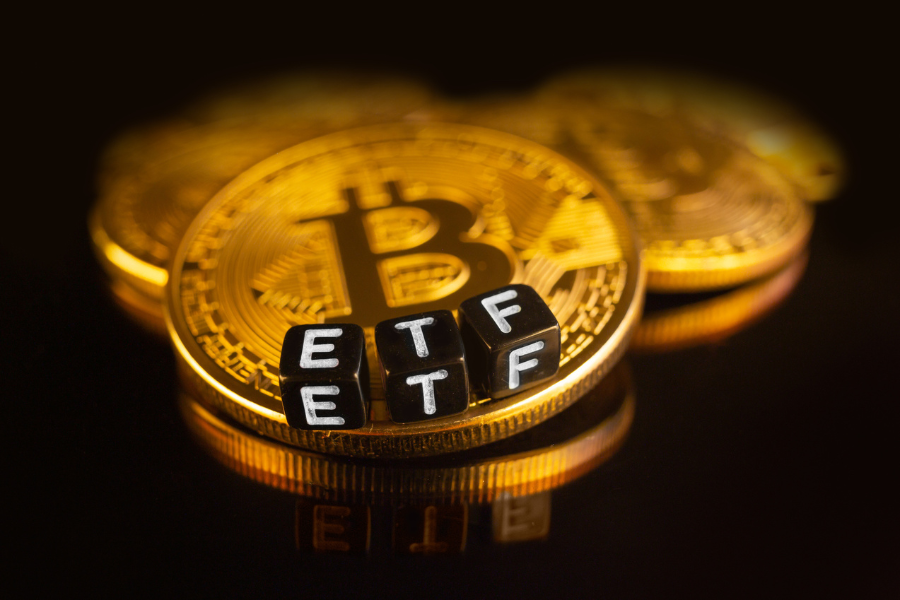

US exchange-traded funds investing directly in Ether achieved overall net inflows of $107 million on their first day of trading in launches that will provide a window onto mainstream crypto demand outside of Bitcoin.
BlackRock Inc.’s iShares Ethereum Trust posted the highest level of subscriptions on Tuesday, $267 million, followed by Bitwise Ethereum on $204 million and the Fidelity Ethereum Fund with $71 million, according to data compiled by Bloomberg.
Over $1 billion worth of shares traded across the nine ETFs, whose launch comes six months after US regulators permitted inaugural US spot-Bitcoin ETFs. The latter have attracted a net inflow of over $17 billion this year.
Ether is the No. 2 digital asset and popular for blockchain-based financial services but the token’s market value is still less than a third of Bitcoin’s, spurring expectations of smaller inflows compared with Bitcoin ETFs.
The Bitcoin funds benefited from a controversial narrative that pitches the top token as digital gold, a spin that Ether lacks. The Ether funds also won’t offer so-called staking rewards for blockchain maintenance, a return that can be harnessed by owning the token directly.
“The flows are in line with our expectation,” said Vivien Wong, a partner at crypto investor HashKey Capital. She expects $3 billion to $5 billion of net inflows for the Ether portfolios over the next six months.
Eight new Ether funds listed on Tuesday while the more than six-year-old Grayscale Ethereum Trust — the largest for Ether with assets of $8.6 billion — converted from a closed-end structure into an ETF. The conversion smooths exits for arbitragers and the product saw a net outflow of $484 million.
There’s a risk such outflows could counteract the positive impact of new subscriptions, potentially exerting “downward” market pressure, Wong said.
Ether underperformed Bitcoin on Wednesday, dropping 1% as of 1:56 p.m. in Singapore compared with steady performance by the original cryptocurrency. Ether’s 85% climb during a digital-asset rebound over the past year trails a 125% jump in Bitcoin, which scaled a record high in March.
The US Ether ETFs posted “a very solid first day of trading,” said Bloomberg Intelligence ETF Analyst Rebecca Sin. She added that “the Ether market is much smaller than the Bitcoin market, so education is critical as we are only at the beginning of a long journey.”
The US Securities and Exchange Commission in May surprisingly pivoted toward approval of spot-Ether ETFs after grudgingly allowing Bitcoin funds in the wake of a court reversal in 2023.
The agency cracked down on the digital-asset industry following the collapse of the FTX exchange but pro-crypto Donald Trump’s push to return to the White House had sparked speculation of a friendlier climate ahead.

Canadian stocks are on a roll in 2025 as the country prepares to name a new Prime Minister.

Two C-level leaders reveal the new time-saving tools they've implemented and what advisors are doing with their newly freed-up hours.

The RIA led by Merrill Lynch veteran John Thiel is helping its advisors take part in the growing trend toward fee-based annuities.

Driven by robust transaction activity amid market turbulence and increased focus on billion-dollar plus targets, Echelon Partners expects another all-time high in 2025.

The looming threat of federal funding cuts to state and local governments has lawmakers weighing a levy that was phased out in 1981.
RIAs face rising regulatory pressure in 2025. Forward-looking firms are responding with embedded technology, not more paperwork.
As inheritances are set to reshape client portfolios and next-gen heirs demand digital-first experiences, firms are retooling their wealth tech stacks and succession models in real time.
